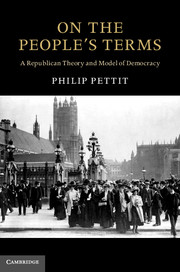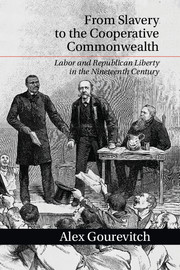On the People's Terms
According to republican theory, we are free persons to the extent that we are protected and secured in the same fundamental choices, on the same public basis, as one another. But there is no public protection or security without a coercive state. Does this mean that any freedom we enjoy is a superficial good that presupposes a deeper, political form of subjection? Philip Pettit addresses this crucial question in On the People's Terms. He argues that state coercion will not involve individual subjection or domination insofar as we enjoy an equally shared form of control over those in power. This claim may seem utopian but it is supported by a realistic model of the institutions that might establish such democratic control. Beginning with a fresh articulation of republican ideas, Pettit develops a highly original account of the rationale of democracy, breathing new life into democratic theory.
- A landmark text in democratic theory from one of the world's leading political philosophers
- Offers both a theory of democracy and a clear model of the institutions that this theory might support
- Of interest to students and scholars of philosophy, politics and law and all those with an interest in political philosophy in practice
Reviews & endorsements
"Republican theory’s lighthouse figure Phillip Pettit’s much awaited and more recent book on democracy offers a sum of his whole oeuvre in practical philosophy … As the title indicates, Pettit not only develops a theoretical argument, he also sketches practical avenues as to how the theory might and should guide our tuning of western democracies. Philosophers and social scientists alike will be intrigued, challenged, and nourished as they explore the book’s pages."
Jean-François Grégoire, Ethical Perspectives
"Pettit provides a thorough, sophisticated account of contemporary republican political thought, and the book would serve as a useful introduction to the topic … he shows how republicanism differs from both communitarianism and liberalism, contrasting his view with thinkers such as Hobbes and Rawls, on the one hand, and Rousseau, on the other. Summing up: recommended."
P. R. Babbitt, Choice
"This is an excellent, closely argued book, remarkable for its clarity and consistency. It is highly accessible and stimulating, especially given its exploration of actual democratic institutions. The book is also highly relevant in showing how political philosophers can pay attention to legitimacy as an independent normative feature of political orders."
Yann Allard-Tremblay, The Philosophical Quarterly
Product details
November 2012Adobe eBook Reader
9781139847841
0 pages
0kg
This ISBN is for an eBook version which is distributed on our behalf by a third party.
Table of Contents
- Introduction: the republic, old and new
- 1. Freedom as non-domination
- 2. Social justice
- 3. Political legitimacy
- 4. Democratic influence
- 5. Democratic control
- Conclusion: the argument, in summary.








